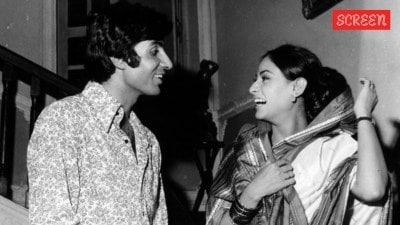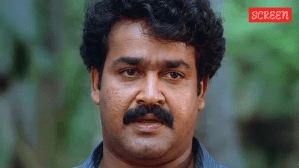Kashmir’s first family
When Omar Abdullah takes over as Chief Minister of Jammu and Kashmir, he is likely to find himself weighed down by the burden of history.

As Omar Abdullah prepares to take over as chief minister of Jammu and Kashmir, he will have to fall back on the history of the National Conference and that of his family. The Sunday Express traces the political journey of three generations of Abdullahs.
By Muzamil Jaleel
When Omar Abdullah takes over as Chief Minister of Jammu and Kashmir, he is likely to find himself weighed down by the burden of history. A scion of Kashmir’s first family, his biggest challenge will be the survival of his National Conference in the changing contours of Kashmir politics. Over the years, the party has drifted from its core political ideology, eroding its traditional base in Kashmir. With the People’s Democratic Party positioning itself as a representative of Kashmiri aspirations, Omar can only save his party by returning to its history and that of his family.
The story of the Abdullah family is intertwined with Kashmir’s politics. The interaction between the National Conference and the Congress too has been dominated by the 71-year-old relationship between the Abdullahs and the Nehru-Gandhi family, alternating between friendship and enmity. Now when the National Conference witnesses the second generational shift coinciding with a new alliance with the Congress, the Omar Abdullah-Rahul Gandhi friendship is creating a buzz. So, will Abdullah Jr be able to turn his party’s politics back to its original discourse, one that made its founder, Sheikh Mohammad Abdullah, the undisputed leader of Kashmir?
The Abdullahs’ journey to the top began from the house of a small shawl trader in Srinagar’s Soura neighbourhood. Sheikh Mohammad Abdullah, the youngest son of Sheikh Mohammad Ibrahim—he died two weeks after his son’s birth—was born into poverty but grew up to become Sher-e-Kashmir (Lion of Kashmir). For Sheikh Mohammad Abdullah, nothing came easy. As a child, he had to walk 10 miles a day to attend school and worked with a grocer to support his family. In his autobiography, Aatish-e-Chinar, Sheikh Abdullah says his dream to join medical school, and later his ambition to go abroad for studies, were thwarted because of the discriminatory policies against Muslims during the Dogra rule in Kashmir.
This was in 1930 and Kashmir was at the brink of a revolt. From the reading room party in downtown Srinagar’s Fatehkadal to the establishment of the Muslim Conference, Sheikh primarily fought for the liberation of Muslims from Dogra rule. His politics changed drastically when Khan Abdul Gaffar Khan introduced him to Jawaharlal Nehru in 1937. In fact, Sheikh credits Nehru for his shift to secular politics. On June 24, 1938, Sheikh renamed the Muslim Conference the ‘National Conference’, thus paving the way for people from other communities to join Kashmir’s freedom movement.
This led to fissures in his party and questions were raised about his leadership. The Muslim leadership of Jammu, like Choudhary Ghulam Abbas and Mirwaiz Yousuf Shah (the grand uncle of Mirwaiz Umar Farooq), resisted this change and parted ways with Sheikh. This division widened when Sheikh turned a nationalist Kashmiri discourse as the central ideology of the National Conference, drifting further away from his initial Muslim-centric discourse. The ideological split became evident during Partition. Sheikh rejected the two-nation theory and instead favoured a special status for J&K within a secular India. His friendship with Nehru and his dislike for Jinnah’s politics was one reason for his decision not to go with Pakistan. The other was his fear of Punjabi Muslim dominance over Kashmir. His ideological opponents, however, favoured the Muslim League discourse—an unresolved issue that continues to haunt Kashmir.
Though Sheikh’s political agenda was clear, his sudden shift towards secularism had confused his party which found it hard to merge its basic Kashmiri Muslim ideology into the larger secular Kashmiri nationalist identity. In fact, this confusion is at the core of every political debacle of the party.
In October 1933, Sheikh married Akbar Jehan, the daughter of a European hotelier Michael Harry Nedou. The couple had seven children—two of them died as infants. Sheikh’s oldest child Khalida, whom he was closest to, would later become part of a protracted family feud over the issue of the NC’s leadership after his death. Her husband Ghulam Mohammad Shah was instrumental in an overnight coup against brother Farooq Abdullah’s government on July 2, 1984, when he broke the NC and took over power with the Congress’s support. The family is still split over this incident.
The twists and turns in the personal relationship between the Abdullahs and the Nehru-Gandhi family too have influenced the NC’s fortunes in J&K. Every time the Congress and the NC struck an alliance, it was because of the personal friendship between the two families. The coalition, however, always ended on a sour note.
While Sheikh didn’t want Kashmir to go with Pakistan in 1947, he largely relied on his friendship with Nehru to get a special status within the Indian Union even as he sought a plebiscite to ratify the Maharaja’s accession treaty with New Delhi. After the Indo-Pak war in October 1947, Sheikh openly supported New Delhi. He introduced the revolutionary land reforms, putting the maximum landholding at 22.75 acres and giving ownership of the land to the tiller.
The NC began implementing its ‘New Kashmir’ manifesto, which was a progressive agenda aimed at putting an end to feudalism. The Delhi agreement of 1952 is seen as the first political compromise by Sheikh and his party to safeguard the special status of Kashmir within the Indian Union but it created suspicions on both sides. Sheikh recalls that when Nehru visited Srinagar on May 16, 1953, he was “not the same man”. This was the first visible sign of bitterness in the friendship, which ended two months later with Nehru ordering Sheikh’s dismissal and arrest. Sheikh’s party soon revived its demand for a plebiscite and waged a struggle that lasted till 1970. During this time, New Delhi had ensured a constitutional integration of Kashmir into the Indian Union, destroying the very basis of the special status of the state.
The bitterness between the Abdullahs and Nehru went away only after the latter’s death. Sheikh became close to Nehru’s daughter, then Prime Minister Indira Gandhi, and in 1975, the Indira-Abdullah accord was signed, paving the way for Sheikh to come to power. But he never accepted an open alliance with the Congress in J&K.
The Congress party soon decided to withdraw its support. But Sheikh returned to power in a historic election in 1977, one of the fairest polls ever held in Kashmir. He owed his impressive win more to his personality than his politics. The opposition from the Jana Sangh and the Congress had only boosted his popularity and the NC once again became the keeper of Kashmir’s regional pride. On August 21, 1981, Sheikh anointed his son Farooq to lead the National Conference. Sheikh died a year later on September 7, 1982, and the National Conference and Kashmir’s history changed.
Farooq Abdullah was unanimously chosen Chief Minister of the state after Sheikh’s death. The seeds of discord, however, had already been sown with Sheikh’s son-in-law, G.M. Shah, an influential leader within the NC, wanting to take over the party. He soon got an opportunity. The assembly election was scheduled for June 1983 and Indira Gandhi offered an NC-Congress alliance. Farooq didn’t agree because he felt that such a coalition would jeopardise his party base in Kashmir. The two families split again, leading to a bitter poll fight, which saw Indira Gandhi campaigning for 10 days against the NC in the Valley. Farooq won the election but the Congress managed to get 26 seats—24 of them in Jammu alone.
Riding on his poll success, Farooq took on Indira Gandhi in national politics and the NC became an important constituent of a national front against the Congress. In October 1983, Farooq organised an impressive conclave of 59 leaders of 17 non-Congress parties in Srinagar to discuss Centre-State relations. This further damaged relations between the two families.
By this time, Farooq had expelled his brother-in-law G.M. Shah from the NC. Shah launched a party, calling it the real National Conference, with his wife—Farooq’s sister Khalida—as president. Farooq’s brother Tariq too joined this new party. In July 1983, Indira Gandhi dislodged the Farooq Abdullah government. Thirteen NC legislators defected and G.M. Shah formed a new government. This was the beginning of a revolt in Kashmir—the ouster of the NC government was seen as New Delhi’s assault on Kashmir’s pride. But unlike Sheikh’s dismissal in 1953, the unceremonious exit had a different effect on Farooq. He started believing that real power came from New Delhi; not through elections. Shah’s government was dismissed in early 1986 and Rajiv Gandhi brought the Abdullah-Nehru families closer. The Congress wanted a poll alliance and later that year, Farooq finally agreed. The two parties forged a pre-poll alliance during the 1987 assembly polls. Abdullah’s decision to go with the Congress hit his credibility in Kashmir. A rigged poll managed to see the alliance through in the assembly election but in the process, it pushed Kashmir towards a violent separatist revolt. The Muslim United Front—an umbrella group of various political and religious parties that had emerged as the main opposition to the NC-Congress alliance—bid goodbye to the ballot and became a separatist conglomerate.
The NC returned to power in 1996 with a two-thirds majority. But now, Farooq’s party was seen as an agent of New Delhi in Kashmir rather than the representatives of Kashmiri aspirations. This mistrust of the NC in Kashmir was further strengthened when Farooq decided to join the BJP-led NDA at the Centre. Farooq’s misgovernance had completely eroded NC’s traditional base within Kashmir. In 1999, Mufti Mohammad Sayeed and his daughter Mehbooba Mufti left the Congress to form a new party—the People’s Democratic Party—with soft separatist and Muslim-centric political leanings. The PDP’s primary aim was to replace NC in Kashmir and the Muslim belt of Jammu province.
Omar Abdullah, meanwhile, had joined politics even as his father had initially wanted him to stay away. He was first made president of the NC’s youth wing and in 1998 fielded as the party’s candidate for the Srinagar parliamentary constituency.
A young Omar won the election but he was completely at odds with Kashmir politics. He had lived most of his life outside Kashmir and didn’t even speak Kashmiri. Meanwhile, sensing the party’s decline in Kashmir, Farooq went back to the NC’s greater autonomy plank and passed an autonomy resolution in the assembly. The Centre, however, rejected it. Farooq could have parted ways with the NDA but he didn’t—Omar had been appointed junior minister in the Vajpayee government. Later, the party had another chance to change its political discourse during the Gujarat riots but it chose not to leave the NDA.
The unpopularity of the Farooq government gave the PDP a golden opportunity to emerge as a potent rival force in Kashmir. In the 2002 assembly polls, the PDP won 16 constituencies. The NC had got 28 seats but the party had clearly lost the mandate to rule Kashmir. Omar, who had been anointed NC president earlier that year, lost the Abdullah bastion—the Ganderbal constituency. Over the last six years, Omar tried his best to get out of his father’s shadow. The party not only snapped ties with the NDA, Abdullah Jr publicly apologised several times for not snapping them earlier. With pressure from the PDP’s radical politics, Omar too re-positioned the party. Unlike his father, he tried to show a reconciliatory tone towards separatists and Pakistan. He made human rights violations a party issue and even promised to upgrade its autonomy demand to “autonomy plus” which would ensure a greater role for Pakistan.
Omar’s personality is as different from his father’s as is his working style. He is very much a family man, preferring to spend time with wife Payal (whom he married in 1994) and their two sons—Zahir and Zamir. During the last six years out of power, he has learned a crucial lesson: his father’s careless approach to governance and politics cannot be repeated.
His first test in public life was even before he was chosen the party’s chief ministerial candidate. The party had brought Farooq back to lead its poll campaign and he was determined to take the top job. Sources say Farooq’s insistence to take the top job had two reasons: a section inside the Abdullah household finds Omar too strict and wanted the father back. Omar has three sisters —Safia, Hina and Sara. Safia is married in Srinagar while Hina (now Hina Collins) and Sara, married to Congress MP Sachin Pilot, both live outside the state. The old guard in the party too was more comfortable with Farooq. With a little help from mother Molly Abdullah, Omar won this round.
But unlike his father, Omar’s challenges as chief minister are many. His primary opponent is in Kashmir. The PDP is competing with his party on a Kashmir-centric agenda. The NC has managed to return to power with the help of the Congress but this time the party cannot even afford to blink. Good governance alone will not determine Omar’s success. The NC will have to return to its past, scan through its history and take lessons. Kashmir is not ready for another six years of status quo and wants Omar to deliver.
- 01
- 02
- 03
- 04
- 05































